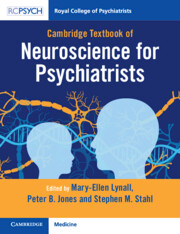Book contents
- Cambridge Textbook Of Neuroscience for Psychiatrists
- Reviews
- Cambridge Textbook of Neuroscience for Psychiatrists
- Copyright page
- Contents
- Contributors
- Introduction
- 1 Cells
- 2 Neurotransmitters and Receptors
- 3 Basic Techniques in Neuroscience
- 3.1 Recording from the Brain
- 3.2 Perturbing Brain Function
- 3.3 Animal Models of Psychiatric Disease
- 3.4 Data Analysis and Computational Modelling
- 3.5 Functional Neuroimaging and Connectivity
- 4 Neuroanatomy
- 5 Neural Circuits
- 6 Modulators
- 7 Genetics
- 8 Neurodevelopment and Neuroplasticity
- 9 Integrated Neurobiology of Specific Syndromes and Treatments
- 10 Neurodegeneration
- Index
3.2 - Perturbing Brain Function
from 3 - Basic Techniques in Neuroscience
Published online by Cambridge University Press: 08 November 2023
- Cambridge Textbook Of Neuroscience for Psychiatrists
- Reviews
- Cambridge Textbook of Neuroscience for Psychiatrists
- Copyright page
- Contents
- Contributors
- Introduction
- 1 Cells
- 2 Neurotransmitters and Receptors
- 3 Basic Techniques in Neuroscience
- 3.1 Recording from the Brain
- 3.2 Perturbing Brain Function
- 3.3 Animal Models of Psychiatric Disease
- 3.4 Data Analysis and Computational Modelling
- 3.5 Functional Neuroimaging and Connectivity
- 4 Neuroanatomy
- 5 Neural Circuits
- 6 Modulators
- 7 Genetics
- 8 Neurodevelopment and Neuroplasticity
- 9 Integrated Neurobiology of Specific Syndromes and Treatments
- 10 Neurodegeneration
- Index
Summary
When scientific studies are observational, based purely on measurement – however sophisticated – the possibility will remain that correlations between two things of interest do not reflect a direct causal connection. For example: suppose you find that a subject’s self-report of auditory hallucinations is associated with increased BOLD signal in brain region X. This doesn’t prove that there’s an abnormality of X (the abnormality might be in region Y, which influences X) or even that activity in X reflects the hallucination itself (perhaps it relates to an emotional response to the hallucination, or to the motor activity required to report it). A true experiment involves manipulating one or more independent variables, with appropriate control conditions, and examining the effects.
- Type
- Chapter
- Information
- Cambridge Textbook of Neuroscience for Psychiatrists , pp. 65 - 66Publisher: Cambridge University PressPrint publication year: 2023



